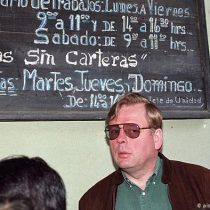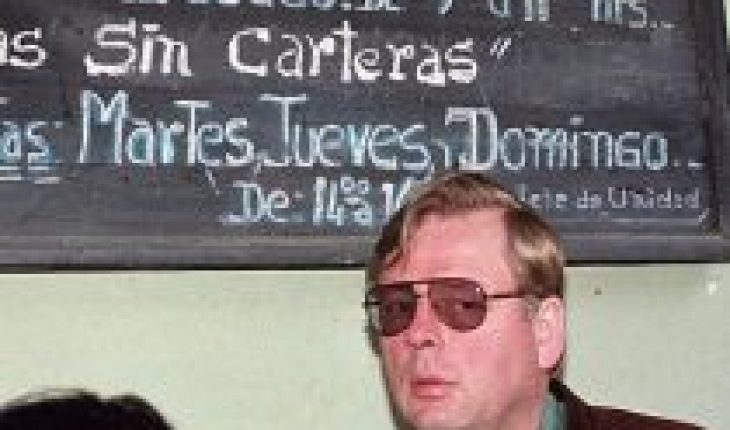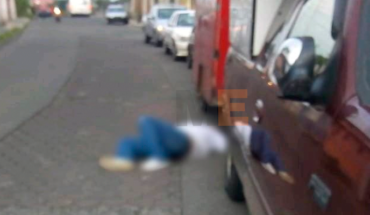
The victims of Colonia Dignidad were deeply disappointed by the decision of the North Rhine-Westphalia Attorney General’s Office, based in Dusseldorf, to dismiss a complaint over the closure of the investigation against the former settlement doctor and right arm of Paul Schofer, leader of the German sect in Chile.
The European Centre for Constitutional and Human Rights (ECCHR) and lawyer Petra Schlagenhauf, who represents a group of victims, had requested the reopening of the summary after krefeld’s prosecutor’s office (Hartmut Hopp’s place of residence in Germany) closed its investigation on the grounds that there was no well-founded suspicion of crime.
Hopp was indagated for complicity in child abuse, involvement in the death and disappearance of three opponents of the dictatorship detained in the German enclave and forced administration of psychopharmaceuticals as a result of bodily harm.
In his statement, Regional Prosecutor Holger Heming states that, following a thorough review and taking into account new background provided, “there is not sufficient reason for a well-founded suspicion” that would prompt Hopp to be charged. With his determination, he supports the work previously done by the Krefeld prosecutor’s office.
Criticism of German justice
Victims, lawyers and human rights organizations describe this ruling as a new confirmation of impunity in the case of Colonia Dignidad, as all investigations initiated in Germany have been closed without any charges being made. They also regret that this country has become a refuge for former hostesses.
“Hopp was convicted in Chile in due process. However, German justice did not recognize this conviction and does not accept the testimonies of the Chilean and German victims who have recognized their victim in Hopp. The same goes for other excolons involved in crimes against humanity, who have fled to Germany escaping Chilean justice,” Romero laments.
Hopp was sentenced to five years in prison in Chile for complicity in the child abuses committed by Paul Schofer. The doctor escaped in 2011 to Germany, where investigations against him have been closed
Consulted by DW, lawyer Hernán Fernández, representative of a group of victims of the enclave, says that “German justice does not repair the mistakes it has made for decades in the Dignity case and re-engages in passivity, lack of diligence and true indolence”.
In his view, “much of the tragedy of the victims was caused by the serious shortcomings of German justice that did nothing effective in protecting them after the escape of Schsfer (from Germany, accused of pedophilia) and criminal hierarchies in the 1960s, or in later years.”
“This is a heavy blow to those of us who demand justice for crimes committed in Colonia Dignidad,” the president of the Association for Memory and Human Rights Colonia Dignidad, Margarita Romero, points out to DW from Chile.
Same accusations, different failures
In 2011, Hopp fled Chile, evading the five-year prison sentence to which he had been convicted of complicity in child abuse, and took refuge in Germany. Although Chilean justice issued an international capture order, Hopp has been able to live freely in the European country for almost a decade, as it does not extradite its citizens.
Nor did German justice accept the Chilean state’s request for Hopp to serve his sentence in a prison in that country. In 2018, in an unappealable decision, the high court in North Rhine-Westphalia rejected this possibility, arguing that the defendant’s involvement in the offences could not be established. It is striking that while Hopp was convicted in Chile, in Germany the prosecution finds no merit in accusing him. “We believe that he here too should be in prison,” ECCHR’s lawyer Andreas Scholler tells DW.
“In our view, the prosecutor did not investigate enough or consult all witnesses. He must have incorporated more sources. It cannot be that Hopp in Chile has been convicted of complicity in sexual abuse, but in Germany it has not been properly investigated. That’s outrageous,” he adds.
“The German state must take care that it is protecting criminals who remain in absolute impunity. We do not know the real reasons for the lack of justice in the face of cryptwhich have been investigated for years and whose background is found in multiple statements by the perpetrators themselves, present in court files of the different cases in Chile,” Romero says.
New legal action
He announces that, together with Schlagenhauf, he will examine possible judicial and administrative actions following the decision of the Dusseldorf Prosecutor’s Office, but acknowledges that these are long and complicated paths.
One of them is a complaint to the High Court of Dusseldorf for the decision of the prosecution. Another possibility is a complaint to the Ministry of Justice of the federal state of North Rhine-Westfalen, which is the highest control registry over the prosecution’s service. “One can complain about the decision and performance of the prosecution and the ministry could eventually commission you to carry out certain investigations,” says Scholler.
After these and other national bodies are exhausted, it does not rule out going to the European Court of Human Rights in Strasbourg.
“Victims have the right to truth and justice. It’s an internationally recognized right,” Romero stresses. In Fernandez’s view, “Never have German policemen, prosecutors or judges been effectively and committed to the heinous crimes and mass human rights violations in Colonia Dignidad. The German state must be brought to international justice.”





